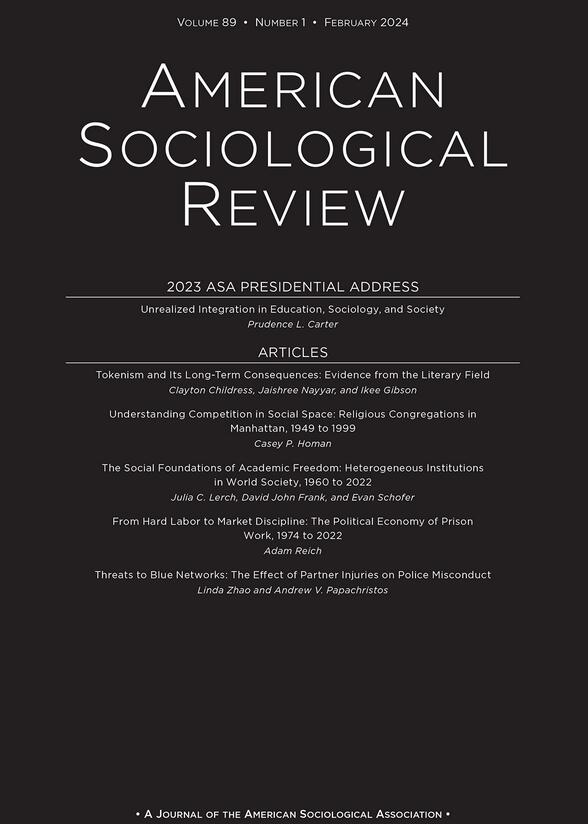Polyoccupationalism: Expertise Stretch and Status Stretch in the Postindustrial Era
IF 6.2
1区 社会学
Q1 SOCIOLOGY
引用次数: 0
Abstract
Past research has posited that occupations are distinct and exclusive communities of workers and used single-entry questions in surveys to measure occupational self-identification. Our study challenges that view by reporting the existence of polyoccupationalism, or workers’ simultaneous identification with multiple occupations. We predict this phenomenon co-occurs with postindustrial forms of work organization and that its expression varies with workers’ position in the occupational structure. Using a survey on creative workers that uniquely allowed respondents to identify with multiple occupations, we find individuals report higher levels of polyoccupationalism when their work is more contract- and project-based, net of other individual and occupational attributes. We further show that polyoccupationalism takes different forms at the top and the bottom of the occupational hierarchy: whereas the polyoccupationalism of high-status “entrepreneurs” stretches expertise—they identify with occupations that are similar in status but functionally distinct—that of lower-status “hustlers” stretches status—the occupations they report involve similar tasks but stand farther apart on the occupational status scale. We discuss the implications of these findings for understanding workers’ occupational identities and the dynamics of occupational hierarchies.多职业主义:后工业时代的专长延伸与地位延伸
过去的研究假设职业是独特的、排他性的工人群体,并在调查中使用单条目问题来衡量职业自我认同。我们的研究通过报告多重职业主义的存在,或工人同时认同多种职业,挑战了这一观点。我们预测这种现象与后工业形式的工作组织共同发生,并且其表达随工人在职业结构中的位置而变化。通过一项针对创意工作者的调查,我们发现当他们的工作更多地基于合同和项目,而不是其他个人和职业属性时,他们的多职业主义水平更高。我们进一步表明,多职业主义在职业等级的顶端和底部表现出不同的形式:而高地位的“企业家”的多职业主义延伸了专业知识——他们认同地位相似但功能不同的职业——低地位的“骗子”的多职业主义延伸了地位——他们报告的职业涉及类似的任务,但在职业地位尺度上相距更远。我们讨论了这些发现对理解工人职业认同和职业等级动态的影响。
本文章由计算机程序翻译,如有差异,请以英文原文为准。
求助全文
约1分钟内获得全文
求助全文
来源期刊

American Sociological Review
SOCIOLOGY-
CiteScore
13.30
自引率
3.30%
发文量
35
期刊介绍:
The American Sociological Association (ASA) is a non-profit membership association established in 1905. Its mission is to advance sociology as a scientific discipline and profession that serves the public good. ASA is comprised of approximately 12,000 members including faculty members, researchers, practitioners, and students in the field of sociology. Roughly 20% of the members work in government, business, or non-profit organizations.
One of ASA's primary endeavors is the publication and dissemination of important sociological research. To this end, they founded the American Sociological Review (ASR) in 1936. ASR is the flagship journal of the association and publishes original works that are of general interest and contribute to the advancement of sociology. The journal seeks to publish new theoretical developments, research results that enhance our understanding of fundamental social processes, and significant methodological innovations. ASR welcomes submissions from all areas of sociology, placing an emphasis on exceptional quality.
Aside from ASR, ASA also publishes 14 professional journals and magazines. Additionally, they organize an annual meeting that attracts over 6,000 participants. ASA's membership consists of scholars, professionals, and students dedicated to the study and application of sociology in various domains of society.
 求助内容:
求助内容: 应助结果提醒方式:
应助结果提醒方式:


